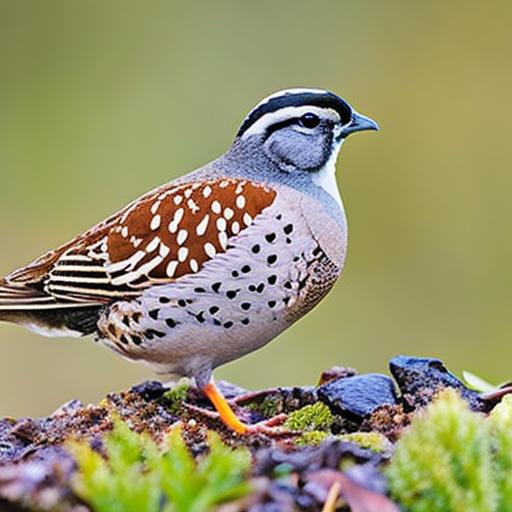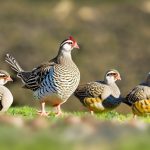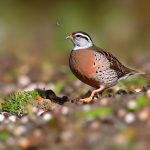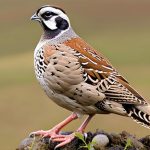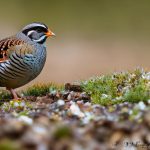Quail are small, ground-dwelling birds that belong to the pheasant family. They are known for their distinctive appearance, with plump bodies, short tails, and round wings. Quail are popular among bird enthusiasts and farmers alike due to their small size, low maintenance, and ability to lay eggs prolifically. There are several species of quail, including the popular Coturnix quail, also known as Japanese quail, which is commonly raised for its eggs and meat.
Quail are social birds that thrive in small flocks, and they are known for their gentle nature. They are relatively easy to care for and can adapt well to a variety of environments, making them an ideal choice for both novice and experienced bird keepers. Quail are also known for their distinctive vocalizations, which include a variety of calls and whistles. Overall, quail are fascinating birds that can make a delightful addition to any avian enthusiast’s collection.
Key Takeaways
- Quail are small ground-dwelling birds that are popular for their eggs and meat, and they require specific care and attention to thrive in captivity.
- When setting up a quail habitat, it’s important to provide a secure and spacious housing, as well as essential equipment such as feeders, waterers, and bedding materials.
- Quail should be fed a balanced diet that includes commercial quail feed, as well as fresh greens, grains, and protein sources to ensure their nutritional needs are met.
- Common health issues in quail include respiratory infections, parasites, and injuries, and it’s important to monitor their health and seek veterinary care when necessary.
- Successful quail breeding and incubation requires proper nesting boxes, temperature control, and regular monitoring of eggs for signs of development and hatching.
- Proper handling and care for quail involves gentle and calm interactions, regular cleaning of their habitat, and providing opportunities for dust bathing and foraging.
- Frequently asked questions about quail ownership include concerns about housing, feeding, egg production, and behavior, with solutions to address these common issues.
Setting Up Your Quail Habitat: Housing and Equipment
When setting up a habitat for quail, it’s important to provide them with a safe and comfortable environment that meets their specific needs. Quail housing should be spacious enough to accommodate the birds’ natural behaviors, such as scratching and dust bathing. A good rule of thumb is to provide at least 1 square foot of space per bird to ensure they have enough room to move around comfortably. Additionally, the housing should be well-ventilated and protected from drafts to prevent respiratory issues.
Quail also require access to a secure outdoor area where they can forage and exercise. This can be achieved by providing a spacious outdoor run that is enclosed with wire mesh to protect the birds from predators. In terms of equipment, quail housing should include nesting boxes for egg-laying, perches for roosting, and feeders and waterers that are easily accessible to the birds. It’s important to regularly clean and maintain the housing to ensure the health and well-being of the quail.
Feeding and Nutrition: What to Feed Your Quail
Proper nutrition is essential for the health and productivity of quail. A balanced diet for quail should consist of high-quality commercial feed that is specifically formulated for game birds. This feed should contain the necessary nutrients, including protein, vitamins, and minerals, to support the birds’ growth, egg production, and overall well-being. Additionally, quail can benefit from supplemental treats such as mealworms, fruits, and vegetables, which can provide enrichment and variety in their diet.
It’s important to provide quail with access to clean, fresh water at all times, as dehydration can quickly lead to health issues. Water should be provided in shallow containers that are easily accessible to the birds. It’s also important to monitor the quail’s feed intake and adjust their diet as needed based on their age, activity level, and reproductive status. By providing a well-balanced diet and ensuring access to clean water, quail owners can help their birds thrive and stay healthy.
Health and Well-being: Common Health Issues and How to Address Them
Like all animals, quail are susceptible to a variety of health issues that can impact their well-being. Common health problems in quail include respiratory infections, parasites, and injuries. It’s important for quail owners to monitor their birds closely for any signs of illness or distress, such as lethargy, decreased appetite, or abnormal droppings. If any health concerns arise, it’s crucial to seek veterinary care from a professional with experience in avian medicine.
Preventative measures can also help maintain the health of quail. This includes regular cleaning of the housing and providing a clean environment with good ventilation. Additionally, practicing good biosecurity measures can help prevent the introduction and spread of diseases within the flock. By staying proactive and attentive to their birds’ health, quail owners can help ensure that their feathered friends lead long and healthy lives.
Breeding and Incubation: Tips for Successfully Breeding Quail
Breeding quail can be a rewarding experience for bird enthusiasts and farmers alike. To successfully breed quail, it’s important to provide them with a suitable environment that encourages natural mating behaviors. This includes providing ample space, nesting boxes, and a balanced diet to support reproductive health. Quail typically reach sexual maturity at around 6-8 weeks of age, at which point they will begin laying eggs.
Once eggs are laid, they can be collected and placed in an incubator for hatching. Quail eggs typically require an incubation period of 17-18 days before they hatch. During this time, it’s important to maintain proper temperature and humidity levels in the incubator to ensure successful hatching. After hatching, the chicks should be provided with a warm brooder environment and access to starter feed to support their growth and development.
Handling and Care: How to Properly Handle and Care for Your Quail
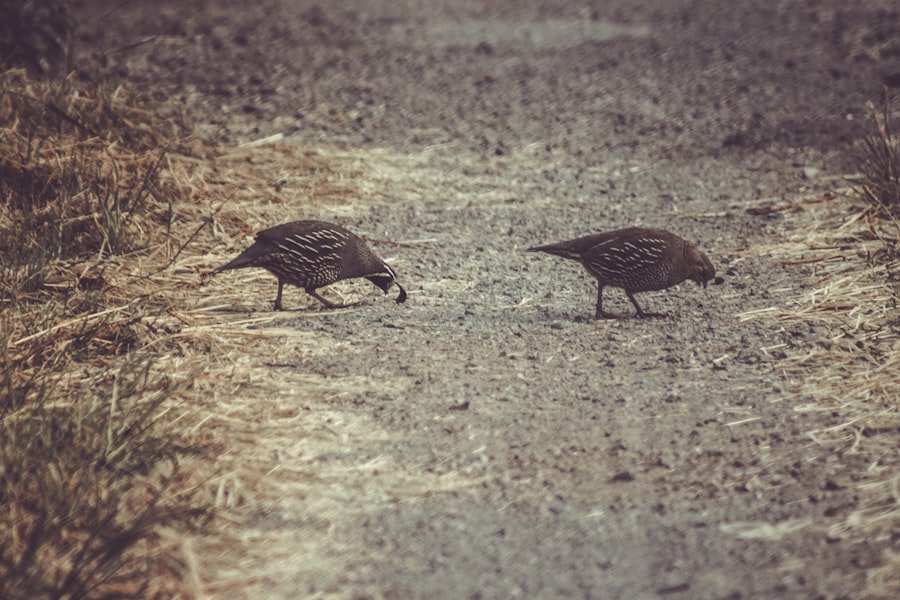
Proper handling and care are essential for maintaining the well-being of quail. When handling quail, it’s important to do so gently and calmly to avoid causing unnecessary stress to the birds. Quail should be handled sparingly and with care to prevent injuries or escape attempts. Additionally, it’s important to provide quail with regular opportunities for exercise and enrichment to support their physical and mental health.
Quail housing should be cleaned regularly to maintain a clean and hygienic environment for the birds. This includes removing soiled bedding, cleaning feeders and waterers, and regularly inspecting the housing for any signs of wear or damage. Providing a clean environment is essential for preventing the spread of disease and ensuring the overall health of the quail. By practicing proper handling techniques and maintaining a clean living environment, quail owners can help ensure the well-being of their feathered friends.
Frequently Asked Questions: Common Concerns and Solutions for Quail Owners
1. What is the best bedding material for quail housing?
– The best bedding material for quail housing is one that is absorbent, easy to clean, and provides good footing for the birds. Popular options include pine shavings, straw, or sand.
2. How can I prevent egg-eating behavior in my quail?
– Egg-eating behavior in quail can be prevented by providing adequate nesting boxes with soft bedding material to cushion the eggs. Additionally, promptly collecting eggs after they are laid can help prevent this behavior from developing.
3. What is the ideal temperature range for quail housing?
– The ideal temperature range for quail housing is between 60-75 degrees Fahrenheit. It’s important to provide a consistent temperature to prevent stress or health issues in the birds.
4. How can I introduce new quail to an existing flock?
– Introducing new quail to an existing flock should be done gradually to minimize aggression or territorial behavior. Providing separate but adjacent living spaces for a period of time can help the birds become accustomed to each other before being fully integrated.
5. What are some signs of illness in quail?
– Signs of illness in quail can include lethargy, decreased appetite, abnormal droppings, respiratory issues, or changes in behavior. It’s important to monitor your birds closely for any signs of distress and seek veterinary care if needed.
In conclusion, understanding the specific needs of quail is essential for providing them with proper care and ensuring their health and well-being. By creating a suitable habitat, providing a balanced diet, monitoring their health closely, and practicing proper handling techniques, quail owners can help their feathered friends thrive in their care. With attention to detail and proactive care, raising quail can be a rewarding experience for bird enthusiasts and farmers alike.
If you’re considering raising quail, you might also be interested in learning about converting a shed into a chicken coop. Poultry Wizard offers a helpful article on turning a shed into a chicken coop, which provides valuable insights and tips for creating a suitable living space for your feathered friends. Whether you’re new to poultry keeping or looking to expand your knowledge, exploring different aspects of coop construction can be beneficial for any aspiring poultry keeper.
FAQs
What are quail?
Quail are small ground-dwelling birds that are commonly kept for their eggs and meat. There are several species of quail, but the most commonly kept for domestic purposes are the Coturnix quail.
What do quail eat?
Quail are omnivores and their diet consists of a variety of foods including commercial quail feed, seeds, grains, insects, and green leafy vegetables.
How much space do quail need?
Quail require a minimum of 1 square foot of space per bird in their living area. It’s important to provide enough space for them to move around comfortably and exhibit natural behaviors.
What kind of housing do quail need?
Quail housing should provide protection from predators and the elements. This can be in the form of a coop or aviary with a secure wire mesh to prevent escapes and keep predators out.
How do you care for quail eggs?
Quail eggs should be collected daily and stored in a cool, dry place. They can be consumed just like chicken eggs and are often used in cooking and baking.
Are quail noisy?
Compared to other poultry, quail are relatively quiet. They make soft, low cooing sounds and are suitable for urban or suburban settings where noise may be a concern.
Can quail be kept with other poultry?
Quail can be kept with other poultry, but it’s important to provide separate housing and ensure that the different species have compatible living conditions and dietary needs.
Meet Walter, the feathered-friend fanatic of Florida! Nestled in the sunshine state, Walter struts through life with his feathered companions, clucking his way to happiness. With a coop that’s fancier than a five-star hotel, he’s the Don Juan of the chicken world. When he’s not teaching his hens to do the cha-cha, you’ll find him in a heated debate with his prized rooster, Sir Clucks-a-Lot. Walter’s poultry passion is no yolk; he’s the sunny-side-up guy you never knew you needed in your flock of friends!

